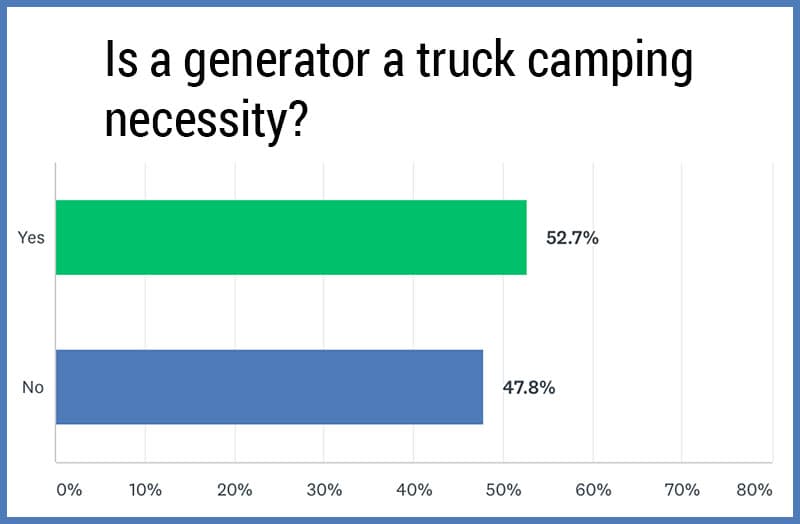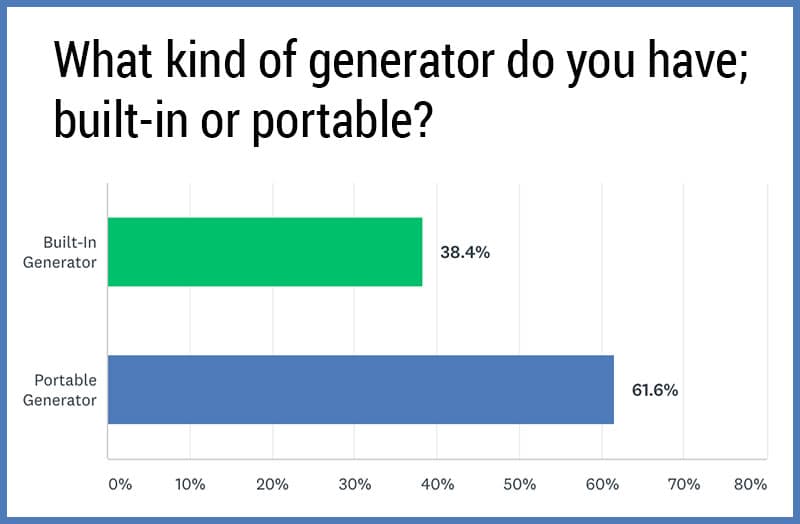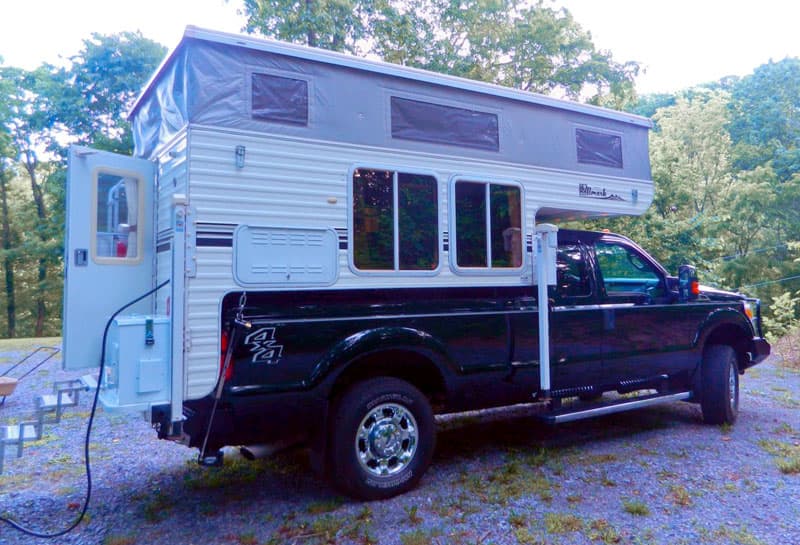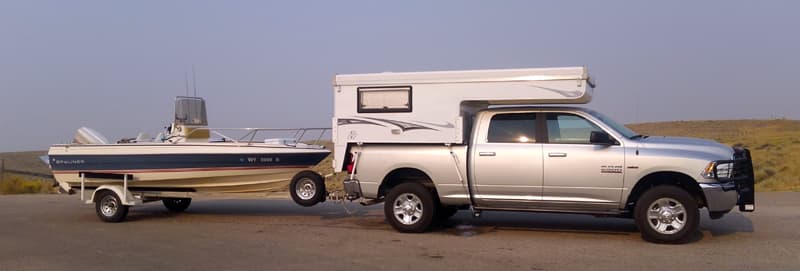We found ourselves a real hot button with this week’s generator poll and Question of the Week. First, more than 600 readers completed the poll and another 200 answered the question. That’s over 40 pages of responses!
“The poll is simple enough, but how are we supposed to proofread 40 pages of responses and get the rest of our work done?” asked Angela with her all too familiar ‘Look at what did you do this time’ look. See what I go through for you folks?
“We could split the responses into two; pop-up responses, and hard side responses,” I suggested. “Then readers can see where the two truck camper types stand on the generator debate.” She bought it.
You’re probably reading this thinking this is a cute introduction, but not what really goes on at TCM HQ. Let me assure you, this is exactly how this went down in our project camper at a Florida campsite the day before this published.
The Generator Poll Results
The first part of this Question of the Week was a two question poll. The following poll results reflect responses from both pop-up and hard-side camper owners.

More than half of Truck Camper Magazine readers believe a generator is essential to their truck camping lifestyle. This mirrors what we have seen in the field; at least half of the rigs have a built-in or portable generator. No surprises here.

For those who have a generator on their truck camper rig, the majority own a portable generator. This also makes sense considering how many truck campers do not offer a built-in generator option, and the fact that portable generators are less expensive, quieter in operation, and more versatile for use beyond truck camping. Built-in generators are more convenient, but are more single-purpose products.
QOTW Response: Pop-Up Campers
What follows are reader responses from pop-up truck camper owners only. We will publish the responses from hard side truck camper owners next week.
“I do not have a generator and prefer camping where there are no others running generators. It’s nice to be able to listen to nature when camping and some of the generators are very noisy. And who wants to hear one start next door at 5:30am when they make coffee?
Two AGM batteries and 160-watts of solar provide plenty of power for my camper even with the compressor refrigerator.” – Stan Blodgett, 2016 Ram 3500, 2016 Four Wheel Camper Hawk

“We carry a Yamaha 2000 housed in an aluminum box I made to fit the rear bumper. I have also had solar on several of our RVs over the years. Solar is fine, but simply not as flexible as having a generator. And real solar systems don’t come cheap. Plus, you can’t always camp in the sun and I don’t feel like monitoring load or solar output.
We actually don’t use the generator very often. Our rule is that if folks around us don’t have one, we don’t run ours. If we have to recharge, we time our generator use for when they are away from their camper. We hate generator noise and assume most others do as well. But in a pinch, it is nice to have.” – Steve Savage, 2012 F350, Hallmark Ute XL
“We have a Honda EU2000i for emergency backup at home, but I do not take it truck camping. I rely on two deep cycle batteries charged by the truck. I would go with solar if I needed it.” – Bill Peters, 2017 Chevy Silverado, 2013 Four Wheel Camper Hawk
“Use solar and leave your flat screens at home. It’s called camping!” – Martin Spriggs, 2007 Ford Ranger, 2014 Four Wheel Camper Eagle
“I have a Generac portable generator. I will have to start using it more often now that I have a BiPAP for sleep apnea.
I have a solar panel that charges the battery everyday. I’m not sure how depleted it will get if I try to get by with an inverter. It wasn’t a hot summer last year so I didn’t have to run the air conditioner much, but I like the security of having the generator.
I camp on the ocean in Montauk, New York and there are no hook-ups. I love the generator. I have had it for two seasons and it is never a problem. It has a readout on it which tells me how many hours are left. It’s very quiet.” – Thomas Vanasco, 2001 Toyota Tacoma, 2016 Northstar 600SS
“I have a 2000-watt Harbor Freight generator that is portable. My camper was made before built-in generators and there is really no room. I move a lot when hunting and fishing. The portable generator is much handier than setting up and taking down portable solar panels. I have considered solar panels for power.” – Jerry Schickedanz, 2005 Ford F250, 1968 Alaskan 8-foot
“I have a portable Honda EU2000i converted to propane by Genconnex. We also have solar with AGM batteries. I really don’t need the generator for most trips. I purchased it just in case. We only bring it along on trips we think we may need extra juice.” – Mark B., 2017 Ford F350, 2017 Hallmark Everest, Oliver Legacy Elite II trailer
“I have an extra battery.” – John Gobershock, 2013 Ram 1500, 2013 Northstar 650
“I have a Honda EU2000i, 100-watts of solar, and two Group 27 deep cycle flooded batteries. Sometimes the sun is just not there, like when you get a foot of snow or are camping in the shade. Every once in awhile I run the air conditioning when it’s 110 degrees outside.
I have used my generator five or six times, but is nice to have when I need it. I built a cabinet on the driver’s side rear to house the generator, so it is easy to get to and is stored outside the camper.” – Chuck Lock, 2015 Ram 2500, 2015 Northstar 850SC
“With a small camper, I have no need for a generator. I have 45-watts of solar on the roof and am good to go. If I pull into a camp area I will do all I can to avoid anybody with a generator. I can’t stand the noise.” – Tom Fitch, 2002 Tacoma, 2016 Outfitter Caribou Lite
“I never had a truck camper without a generator. I have always had a portable one. My previous one was a Yamaha 2800, which I sold last year since it was over 12 years old and I was getting concerned about reliability issues.
My present generator is a Champion 2000-watt Inverter. At 65 pounds (fueled) it’s easy enough for me to handle and its shape (rectangular box) makes it conducive to stowing. It takes up little room.
I only use Inverter generators because they are extremely quiet and relatively light weight. I will only have a portable generator because I can load the unit in the camper when traveling and have the unit as far forward as possible on the floor. That keeps the center of gravity ahead of the rear axle and improves weight distribution. I also have my batteries (two Group 24s), my fresh water tank, and any heavier items like extra water containers as far forward as possible, keeping the weight centralized on the truck.
My other issue with an onboard unit (like the Cummins Onan) is, it’s a two-pole non-inverter unit. As such it must run at 3600rpm to make power. That equates to excess noise. Being located inside the camper further amplifies the sound.
Because I mostly camp in the woods, I need a generator to keep my batteries charged. Solar isn’t an option for me. The forest canopy negates any solar advantage. I also use a CPAP machine (running through an Aims Power 1500 watt PSW Inverter) so I need to recharge my batteries (flooded cell deep cycle) daily to keep them above the magic 50-percent charge.
I would never consider an onboard generator because of the noise factor and the weight factor (behind the rear axle). My Inverter sits outside the camper, usually toward the front of the truck and on economy mode. You cannot even hear it inside the camper and it won’t disturb anyone around because it’s very quiet.
I want to touch on the ongoing Honda versus everyone else generator debates that seem to pop up on every RV forum. My personal observation is, while Honda and Yamaha were the original inverter generator builders, the newer offerings are just as reliable and for the most part, much less expensive than either the Honda or Yamaha of equal wattage output.
My Champion has been stone reliable for three years now, never failing to start on the first pull. I expect it to last as long, if not longer than my Yamaha did. I realize that purchasing a generator is a discretionary purchase, but cost versus function is important to me.” – Daryl Davis, 1997 Ford F350, 2015 Palomino SS1500
“My Honda eu2000i has worked just fantastic for all my camping needs and especially during my Alaska adventure last summer. I’ve added an auxiliary 6-gallon boat fuel tank for insane fuel endurance if I desire. For me, it’s a wonderful investment.” – Shellie Barnes, 2017 Ford F250, 2017 Palomino SS-550
“Solar panels help. Know your power consumption and prioritize what you need your power for. An air conditioner needs a generator.” – Tom Regan, 2017 GMC 3500, 2017 Alaskan 8.5-foot
“No need for a generator. I use a Yeti cooler instead of a refrigerator, and my camper’s two batteries are overkill for my needs (just LED lights, a HotLogic electric lunchbox, and charging my phone and iPad). If I someday need more energy I’d consider getting a portable solar panel. My camper came pre-wired for it.” – Christine Dyer, 2012 Chevy Silverado, 2016 Four Wheel Camper Hawk Shell
“I have a Yamaha 2000 that I bought primarily to keep my boat and camper batteries charged when not in use. My camper also has an 85-watt solar panel on the roof. I’ve found that the more familiar I get with my gear and trust it, the less I use the generator. In fact, the last time I went to Overland Expo in Arizona I didn’t use it at all.
Of course, being camped out in a totally exposed dry lake bed at over 7,000 feet of altitude there was no shortage of sunlight on the solar panel to keep things charged. I’ve also not had any problems camped out in rainy old Washington State where I live. Still, I always take the generator with me just in case. It’s better to have and not need it than to need it and not have it.
It’s best to know your system and its limitations to avoid problems and obtain and learn how to use a good quality battery monitor. And last, I’ve added a Zamp Solar 200-watt portable panel that plugs right into the camper batteries so I should have plenty of juice. I’ve also added a hour meter to my generator (available from Yamaha) to keep tabs on engine time, which adds up faster than you might think.” – Steve Timmings, 2003 Ford F350, 2013 Four Wheel Camper Hawk SC

“I owned a Honda EU2000i generator prior to the purchase of my new camper. It depends on the planned trip on whether I take the generator. Most of my camping in Wyoming is boondocking in remote areas or at various lakes in approved camping spots.
I’m not in the camper much as I am camping. If I’m going to be over five days, I will use the generator to charge the battery. With the boat I will use the generator to charge the boat accessory’s battery. So, the generator is used as a tool, depending on the trip.” – Jerry Oakley, 2017 Dodge Ram 2500HD, 2016 Northstar 650C
“I purchased a Predator Inverter 2000-watt generator from Harbor Freight for less than $500. It’s primarily to recharge the battery in the camper during extended stays while dry camping.
I have used it twice for a group of three truck campers. We were all able to charge at once. We did this daily with the generator on economy mode using less than two gallons of gas over three days operation.
In comparison to a much more expensive Honda generator, it is quiet, the vent cap closes tight for transporting without releasing a gas smell, it’s light enough, and it’s small enough to easily load into back of camper.
I made a 5/8-inch plywood box about three-quarters of the height of the generator. It has hand holes and box joints that I place the generator, a quart of oil, and a heavy 50-foot three outlet extension cord inside. This keeps the generator upright without it moving around while transporting. I am very pleased with it so far.” – Michael Henderson, 2000 Dodge Ram 2500, 2004 Alaskan 10-foot Cabover
“I think it’s a mindset. I have two remote camps that can only be accessed by boat. I view the camper in the same light. I want to be able to travel, but not drag all the conveniences of home around with me.
I almost exclusively dry camp. A gas ice box is a luxury. I only need power for lights, the occasional furnace, Max Air vent, iPad and phone. My truck generator does fine, almost daily recharging my single camper battery.” – Frank Tuttle, 2013 Tacoma, 2017 Four Wheel Camper Swift
“We specifically ordered our Hallmark camper so that we don’t have to have a generator. We plan on following the sun as much as possible. So, we go south in the winter and north in the summer. No air conditioner and no television for us.
Having said that, we have 200-watts of solar and a pair of 6-volt deep cycle batteries to store the charge. All lighting is LED and of course our truck charges the batteries when we’re driving. So far we’ve never been close to running out.” – Eddie Fort, 2016 Ford F-350, 2016 Hallmark Everest
“I would prefer a built-in generator, but make due with a portable Yamaha that stores nicely in the shower for the drive. Then I bike lock it to something on the outside of the truck for use.” – Steven Witzigman, 2017 Chevy 3500HD, 1998 Palomino Bronco 1500
